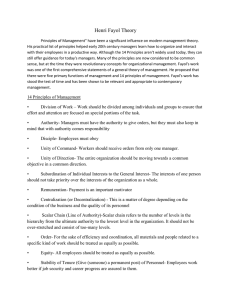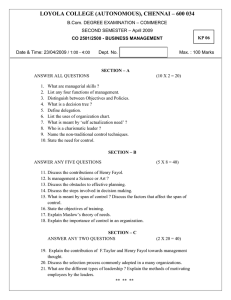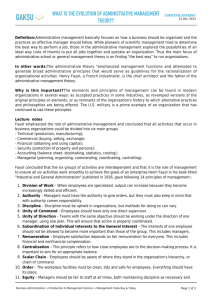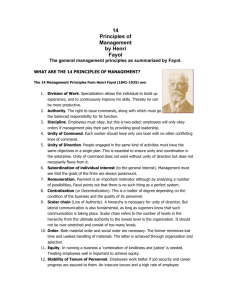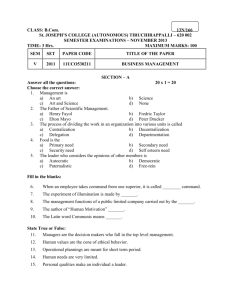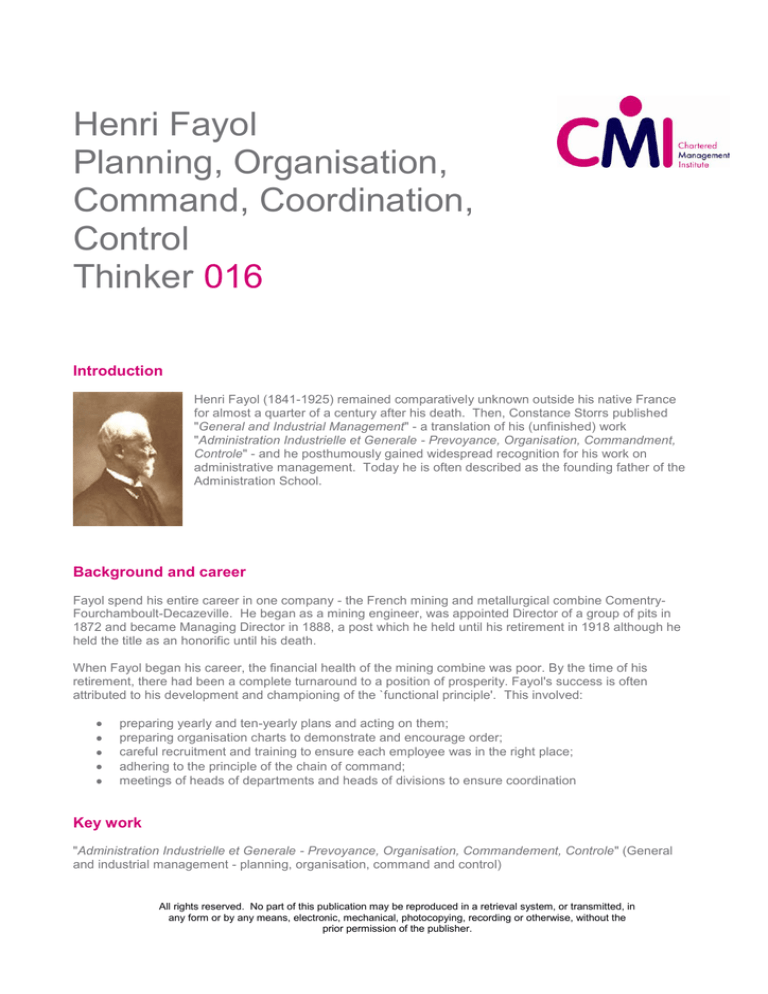
Henri Fayol
Planning, Organisation,
Command, Coordination,
Control
Thinker 016
Introduction
Henri Fayol (1841-1925) remained comparatively unknown outside his native France
for almost a quarter of a century after his death. Then, Constance Storrs published
"General and Industrial Management" - a translation of his (unfinished) work
"Administration Industrielle et Generale - Prevoyance, Organisation, Commandment,
Controle" - and he posthumously gained widespread recognition for his work on
administrative management. Today he is often described as the founding father of the
Administration School.
Background and career
Fayol spend his entire career in one company - the French mining and metallurgical combine ComentryFourchamboult-Decazeville. He began as a mining engineer, was appointed Director of a group of pits in
1872 and became Managing Director in 1888, a post which he held until his retirement in 1918 although he
held the title as an honorific until his death.
When Fayol began his career, the financial health of the mining combine was poor. By the time of his
retirement, there had been a complete turnaround to a position of prosperity. Fayol's success is often
attributed to his development and championing of the `functional principle'. This involved:
preparing yearly and ten-yearly plans and acting on them;
preparing organisation charts to demonstrate and encourage order;
careful recruitment and training to ensure each employee was in the right place;
adhering to the principle of the chain of command;
meetings of heads of departments and heads of divisions to ensure coordination
Key work
"Administration Industrielle et Generale - Prevoyance, Organisation, Commandement, Controle" (General
and industrial management - planning, organisation, command and control)
All rights reserved. No part of this publication may be reproduced in a retrieval system, or transmitted, in
any form or by any means, electronic, mechanical, photocopying, recording or otherwise, without the
prior permission of the publisher.
In his writing, Fayol attempted to construct a theory of management which could be used as a basis for
formal management education and training. Fayol firstly divided all organisational activities into six functions:
1.
2.
3.
4.
5.
6.
Technical: engineering, production, manufacture, adaptation.
Commercial: buying, selling, exchange.
Financial: the search for optimum use of capital.
Security: protection of assets and personnel.
Accounting: stocktaking, balance sheets, costs, statistics.
Managerial: planning, organising, commanding, coordinating, controlling.
Although well understood in their own right, none of the first five of these functions takes account of: drawing
up a broad plan of where the business is going and how it will operate, organising people, coordinating all of
the organisation's efforts and activities, and monitoring to check that what is planned is actually carried out.
Fayol's sixth function, therefore, acts as an umbrella to the previous five.
Fayol argued that to manage is to:
Plan: A good plan of action should be flexible, continuous, relevant and accurate, as it unifies the
organisation by focusing on the nature, priorities and condition of the business, longer-term predictions for
the industry and economy, the intuitions of key thinkers, and strategic sector analyses from specialist staff
groups.
For effective planning, managers should be skilled in the art of handling people, have considerable energy
and a measure of moral courage, have some continuity of tenure, be competent in the specialised
requirements of the business, have general business experience and the ability to generate creative ideas.
Organise: Organising is as much about lines of responsibility and authority as it is about communication flow
and the use of resources. Fayol lays down the following organisation duties for managers:
ensure the plan is judiciously prepared and strictly carried out, see that human and material
structures are consistent with objectives,
resources and general operating policies
set up a single guiding authority and establish lines of communication throughout the organisation
harmonise activities and coordinate efforts, formulate clear distinct and precise decisions
arrange for efficient personnel selection
define duties clearly
encourage a liking for initiative and responsibility
offer fair and suitable recompense for services rendered, make use of sanctions in cases of fault and
error
maintain discipline
ensure that individual interests are subordinated to the general interest
pay special attention to the authority of command
supervise both material and human order
have everything under control
fight against an excess of regulations, red tape and paperwork.
Coordinate: Coordination involves determining the timing and sequencing of activities so that they mesh
properly, allocating the appropriate proportions of resources, times and priority, and adapting means to ends.
Command: Managers who have command should:
gain a thorough knowledge of their personnel
eliminate the incompetent (This is not as final as it sounds! Fayol takes pains to point out that any
decision to separate with an employee should be the result of careful thought, that the employee
should have had fairly assigned work for which (s)he was trained, that (s)he was fairly and
objectively appraised and honest feedback was provided, that (s)he had been given every
opportunity for additional training, offered guidance and that, where possible, (s)he was re-assigned
to alternative work. Fayol also mentions procedures involving written warnings and protection
against bias and "inequities").
be well versed in the agreements between the business and its employees
set a good example
All rights reserved. No part of this publication may be reproduced in a retrieval system, or transmitted, in
any form or by any means, electronic, mechanical, photocopying, recording or otherwise, without the
prior permission of the publisher.
conduct periodic audits of the organisation
bring together senior assistants to ensure unity of direction and focus of efforts
not become engrossed in detail
aim at making energy, initiative, loyalty and unity prevail amongst staff.
Control: Controlling means:
checking that everything occurs according to the plan adopted, the principles established and the
instructions issued
taking appropriate corrective action
periodically checking for weaknesses, errors and deviations from the plan
checking that the plan is kept up to date (it is not cast in stone but adapts to changing
developments). (managers).
Fayol's Principles of Management
Fayol's five-point approach advises managers on their tasks, duties and activities. From his own experience
he established a number of general Principles of Management which lend definition, description and
technique to this approach.
Division of work: specialisation allows the individual to build up expertise and therefore be more
productive.
Authority: the right to issue commands, along with the appropriate responsibility.
Discipline: two-sided - employees obey orders only if management play their part by providing good
leadership.
Unity of command: one man-one boss, with no other conflicting lines of command.
Unity of direction: staff involved in the same activities should have the same objectives.
Subordination of individual interest to general interest: the interests of the organisation must come
first over any group, just as the interests of any agreed team objectives should come first over the
individual.
Remuneration: should be fair and equitable, encourage productivity by rewarding well-directed effort,
should not be subject to abuse.
Centralisation: there is no formula to advocate centralisation or decentralisation; much depends on
the optimum operating conditions of the business.
Scalar chain: Fayol recognised that although hierarchies are essential, they do not always make for
the swiftest communication, and that lateral communication is also fundamental.
Order: Avoidance of duplication and waste through good organisation.
Equity: "A combination of kindliness and justice" in dealing with employees.
Stability of tenure: The more successful the business, the more stable the management.
Initiative: Encouraging people to use their initiative is a source of strength for the organisation.
Esprit de corps: Management must foster and develop the morale of its employees and encourage
each employee to use their abilities.
Influence
It is hard to over-estimate the influence Fayol has brought to bear on management thinking - and
management thinkers. Labelled the founding father of the Administration school, he was the first author to
look at the organisation from the `top down', to identify management as a process, to break that process
down into logical subdivisions and to lay out a series of principles to make best use of people - thereby
establishing a syllabus for management education.
The fact that his influence has endured is expressed no better than in the influential (although perhaps
prescriptive) classical management formula POSDCORB, a notion directly derived from Fayol's writings that
managers Plan, Organise, Staff, Direct, Coordinate, Report and Budget.
But if we look back a little more closely at the detail and description of Fayol's five management activities, we
see that the conflicts and concerns, the responsibilities and duties, the styles and the problems which he
All rights reserved. No part of this publication may be reproduced in a retrieval system, or transmitted, in
any form or by any means, electronic, mechanical, photocopying, recording or otherwise, without the
prior permission of the publisher.
identified 100 years ago are still just as relevant today. How do we "ensure that individual interests are
subordinated to (harmonised with) the general interest"? How do we "encourage a liking for initiative and
responsibility"? And if the "fight against an excess of regulations, red tape and paperwork" was problematic
enough for Fayol to regard it as a management duty 100 years ago, he would arguably be disappointed at
how little progress has been made.
Fayol's last two management activities - command and control - have also been taken to describe the
hierarchical structure and management style which large organisations adopted from the 1950s through to
the 1980s. Again, if we look closely at what Fayol actually says - especially about command - it would not be
too distant from a description of an empowering, not a `commanding', manager today.
Fayol's views have been criticised for weaknesses of analysis and assessment, for the overlap in his
principles, elements and duties, for confusing structure with process, and for an over-reliance on top-down
bureaucracy. Although criticised for lack of clarity, his principles of management do not differ greatly from
the characteristics of formal organisations - or bureaucracies - as set out by Max Weber. His influence as
the first to describe management as a top-down process based on planning and the organisation of people,
will ensure his prominence amongst students and practising managers alike.
Key work by Fayol
The editions cited here are those held in, available for loan to members from, the CMI library. They may not
always be the first edition.
Book
General and Industrial Management, Henri Fayol (revised by Irwin Gray)
London: Pitman, 1984
Further reading
Fayol on administration, M B Brodie
London: Lyon Grant and Green, 1967
The principles and practice of management, Edward Brech, 3rd ed
London: Longman, 1975
Great writers on organizations: the omnibus edition, Derek S Pugh and David J Hickson
Aldershot: Dartmouth, 1993
Financial Times handbook of management,
Stuart Crainer
London: Pitman, 1995
Revisiting Fayol anticipating contemporary management, Lee D Parker and Philip A Ritson,
British Journal of Management, Sep vol 16 no 3 2005, pp175-194
This is one of many thinkers available to all CMI members. For more information please contact
t: 01536 204222
e: enquiries@managers.org.uk
w: www.managers.org.uk
Chartered Management Institute
Management House, Cottingham Road, Corby NN17 1TT.
Text revised 2002
Further reading updated Jan 2012
All rights reserved. No part of this publication may be reproduced in a retrieval system, or transmitted, in
any form or by any means, electronic, mechanical, photocopying, recording or otherwise, without the
prior permission of the publisher.

